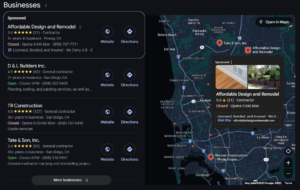The Ultimate Guide to Marketing for Contractors
How important is marketing for contractors? I can’t tell you how many times I have heard a contractor say “I stay busy enough with word of mouth.” Yeah, sure, that’s a great way for you and one or two helpers to stay busy. However, there are companies out there that want to GROW and marketing is essential for any contractor looking to grow their business beyond the typical handyman service. To be competitive in today’s digital landscape you have to create processes and invest in tactics that will attract high-quality leads and ensure you stay ahead of your competition. Traditional word of mouth isn’t enough-you need a strong online presence to generate consistent leads and secure more projects. This guide will walk you through the most effective marketing for contractors that I have personally used to help my clients. My strategies include SEO, Google Business Profile Optimization, Social Media Marketing, and paid ads such as Google PPC ads or Local Search Ads.
Search Engine Optimization (SEO) for Contractors
This is the foundation of digital marketing for contractors. When a potential client searches for services like “general contractor in (your city)” or “hvac repair near me” you have to be at the top of search results in order to capture those leads and drive revenue. Here are some key tactics that you can use to enhance your websites search rankings and get more traffic for your business:
- Keyword Research – researching relevant keywords is, without a doubt, the most important part of SEO. When you first start out I recommend finding search terms that have volume (meaning they get searched regularly) but don’t have a lot of competition. You can use free tools like Google’s Keyword Planner or a paid SEO tool such as Semrush to research potential keywords and determine if they are worth targeting.
- On Page SEO – once you identify keywords that have good ranking opportunities, its time to update your website to target them. The first part is to assign each page on your site with a search term and then optimize that page. On page optimization would mean optimizing your headings (H1 especially), SEO title tags and meta descriptions, and image alt text. Its also good to include the target keyword in the first paragraph of text on the page.
- Local SEO – Optimizing your website for geo-targeted keywords such as “hvac repair (your city)” is a great tactic for local companies. You should also ensure that your company is listed in local business directories like yellowpages, yelp, etc. Ensure the info in your profile on those pages matches the business name, address, and phone number that you have listed on your Google Business Profile.
- Backlinks – Building backlinks are the key to increasing your search rankings and without them you won’t rank at all. However, BE CAREFUL. Just getting any backlink isn’t going to help you so you should be targeted and picky about the backlinks that you go after. If you’re a contractor, you don’t want a website about finance or cooking linking to you, it doesn’t make any sense. You should put your energy into getting backlinks from websites that are both reputable and in the same industry as you.
SEO is a long-term strategy, but with proper keyword research and optimization that is done by someone experienced, it doesn’t take long to see results. I can’t tell you how many times a contractor has asked me if SEO on their website is necessary and my answer is always the same. You can leave your website without optimization and just have it there as a formality, but you need to ask yourself. Do you want your website to be a business expense, or a business asset? If asset is your answer then yes, SEO is necessary.
Google Business Profile Optimization
Do you know why SEO by itself isn’t as effective as it used to be, especially for small local businesses? Business profiles are why. This is the big box of company listings that shows up in search results above all of the company websites. Its the reason that a website ranking #1 for a term that is searched 3,500 times per month, only gets about 1,500 visits per month as a result of that search. Don’t get me wrong, those visits are important but where are the rest going? They are going to companies that have a high quality Google Business Profile. How should you optimize your GBP to ensure its driving leads?
- Make sure it’s complete – Fill out every section, including your services, business hours, adding photos, and make sure you have a detailed business description that aligns with what someone might search when looking for your services.
- High Quality Content – I can’t stress enough how important it is to invest in content and make sure it stands out. You should upload images of completed projects, team members on the job, and more. Use high quality, professional grade if possible, content to showcase your work and your crew.
- Keep Contact Info Consistent – Ensure that the business name, address, and phone number (NAP) listed on your Google Business Profile is the same information used in any other local directories or company pages.
- Regular Updates – you can update your profile with “posts” similar to a social media page. Do this regularly, at least once a week, to showcase your skills and give potential clients something to be impressed by.
- Reviews – lastly and arguably the most important thing would be your reviews. You need to put a review collection process in place so that you are regularly getting reviews from happy clients. This can be as simple as an email campaign going out to customers after their project completes, or take it a step further and have someone designated to calling customers after their project is over and getting the review personally. Google has put out statements before saying that their algorithm favors companies with a lot of positive reviews so not only will it impress potential clients, but it impresses the algorithm as well.
Social Media Marketing for Contractors (Organic Growth)
Social media is an excellent way for contractors to build brand awareness, impress potential clients, and above all else, drive leads into your inbox. Ensure that you put out high quality content that will shine a professional light on your company. Blurry cellphone photos with captions that are misspelled or poorly written is not going to be a good first impression on a potential customer. For most contractors I recommend using Facebook for a direct to consumer approach. Engaging in local groups, sharing project updates, and even running the occasional promotion are good ways to leverage this platform. If you’re a contractor that wants to market to other businesses then I recommend LinkedIn. To be clear, I don’t recommend messaging as many people as possible and bugging the crap out of them. It doesn’t look good for you or your brand so don’t do that, and don’t let anyone tell you that it works. Instead, generate content that resonates with the types of companies you want to target, position yourself as an industry leader with experience and knowledge that they can come to when they have a need for your services.
Content Ideas:
Project spotlight – some before and after photos or video walkthroughs of a completed project are a great way to engage your followers and get them commenting. If you have someone that doesn’t mind being on camera and talking about the project, even better. People will engage with content more if there are other people in it.
Educational posts – This could be something along the lines of DIY tips from a home improvement company, maintenance advice from HVAC experts, etc. The idea is to provide useful information that a client will remember when the time comes that they need your services.
Testimonials – Post reviews that clients give you to show that you provide results that make your customers happy. Written reviews are great but if you have a customer that is willing to give you a video testimonial, those can be much more engaging, so get them when you can.
Behind the scenes – Photos of your crew working, team introductions, and progress photos/videos are also great ways to engage with your audience.
A lot of people say that consistency is key with social media. While I agree with that for the most part, I also think that consistency paired with quality is the best strategy. One high quality post with solid content is going to produce a lot more traffic than multiple posts that are made out of some graphic on Canva with info that nobody cares about. Invest in a professional photographer/videographer or put a little money into a decent camera for yourself if outsourcing it isn’t in the budget yet. What you put out there reflects on your company, make sure it reflects well.
Google Ads & Local Search Ads
Google Pay Per Click (PPC) ads are the most common type of Google Ad, but recently they also started offering Local Search Ads for company types that qualify for it. While organic marketing like SEO and social media can take time before you see results, paid ads are a good way to get fast results by putting your business in front of people actively searching for your services.
Best practices for your ads
Keyword Research – similar to SEO you will pick out terms that you want to target with your ads and then when someone searches those terms, you show up at the top. You should use the Google Keyword Planner for this just like you would SEO. Try to identify terms that have a low bid price but still get searched regularly, especially if you’re on a small budget. This video by Google Ads expert, Ben Heath, gives some great information on how to do Google Ads the right way when working with a small budget.
Goals & Conversion Tracking – I’ve never seen great success with a general google ad campaign “to just see what happens” and you send people to your website’s home or contact page. You might get lucky and get some leads out of it but I prefer to have a specific goal for a campaign (i.e. a general contractor wants to book more new home construction projects). Once you have a goal in mind its time to do the keyword research and find things that people looking for your target service would search for. In addition to strong keyword research I would also create an extremely relevant landing page that has relevant information, photos, and testimonials specific to the service we are trying to target. You can also give these landing pages their own contact form which you can easily use to track the effectiveness of your ad along with Google’s conversion tracking.
Monitoring & Adjustments – You should analyze the performance of your campaigns regularly and adjust them as needed. Your targeting, keywords, and budget will likely need some adjusting before you find the right groove for the campaign. You should also be sure to monitor the analytics of your landing page to see how things are converting once they are off the google ad and land on the site so you can make adjustments there as needed.
Successful marketing for contractors requires a hybrid approach, using multiple different strategies and the topics laid out in this article are the ones I would start with. By dominating search rankings and having a strong social media strategy, you will create a powerful online presence that drives high quality leads. For additional questions regarding marketing for contractors please head to our contact page and submit the form when any questions you may have.


